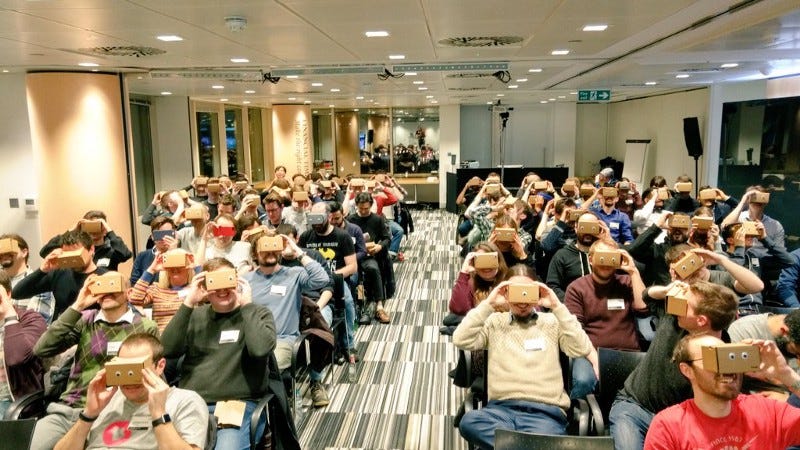4 ways Virtual Reality can now step up and help the world
For many, it feels as though we are increasingly living in an age of political anger and polarisation. Admittedly, technology has had its part to play in that, but as an optimistic technologist, I hope that it can continue to improve our lives overall. In particular, I’m intrigued by the part that virtual reality may play, now that we are at the beginning of its mainstream adoption.
Here are four ways that VR could start to help the world:
1. Connect people across borders
Whatever your views on US “extreme vetting”, recent events have highlighted that gathering people together from across the globe can prove problematic. One of the many questions this has raised is for conference organisers: where should you host international events, if you wish to remain inclusive? As this post and the resulting comments explain, moving events outside the US may introduce border issues for US inhabitants too.
As one visitor commented, perhaps we may start to see increased conference participation through virtual reality.

100 users in a single shared VR environment — Ada’s demo at London Web Performance — photo by Perry Dyball
VR conferencing is not a new idea, but it’s feels more in need than ever. The technology is nearing mainstream quality, availability and affordability. With her recent Metaverse demo, my colleague Ada showed how it’s possible to quickly develop a multi-participant VR experience using open web technologies. I’m sure we’ll soon start to see many other examples, helping to boost international cooperation.
2. Mitigate our housing crises
“Nobody can figure out how to fix San Francisco’s housing crisis”.
- Vice
It is well known how house prices have soared in recent years, in cities such as San Francisco and London. Of course it is not an entire solution, but perhaps as virtual reality burgeons, it can start to help. As our productivity and collaboration moves increasingly into the virtual world, physical co-location becomes less important. Virtual reality can help to increase the number of remote workers, reducing the demand for housing within physical proximities. If VR-enabled remote working takes off, technology companies in hotspots like Silicon Valley are likely to be early adopters.
3. Boost empathy
Chris Milk famously spoke about virtual reality as the “ultimate empathy machine”, since it can instantly transport us into someone else’s perspective of the world.
Ava Kofman explored this idea further in “Will Virtual Reality Make Us Feel Better?”, discussing the reaction to Project Syria:
“Many viewers remove their headsets visibly shaken by the experience. De La Peña credits these reactions to the “visceral” immediacy, embodiment, and sensory engagement inherent to the medium. She says that these responses to Project Syria have translated into tangible fundraising efforts for the Syrian refugee cause.”
Given our apparently increasing filter bubbles and polarisation, the ‘ultimate empathy machine’ feels more urgent than ever. VR can make it easy to break out of our localised bubbles, without leaving the couch.
4. Escape reality
And when all else fails and we need some simple respite from harsh reality, at least we can escape into a virtual one!

Guided Meditation VR by Cubicle Ninjas
Startups are now beginning to offer VR meditation and mindfulness experiences. An example is Cubicle Ninjas’ Guided Meditation VR. Their founder Josh Farkas has said that “the amount of research proving viability of VR as both a meditation aid, pain reliever, and a tool for empathy, is staggering.”
Particularly encouraging are the VR trials being conducted in hospitals that appear to demonstrate its effective pain relief:
“[The] worst pain can be alleviated by manipulating the way the human mind works: the more you focus on pain, the worse it feels. Swamp the brain with an overload of sensory inputs — such as with the immersion in a virtual world — and its capacity to process pain, to be conscious of it, goes down.”
- Hospitals try giving patients a dose of VR — Bloomberg
There is a risk that some may get too drawn into virtual worlds and start to neglect the real one. However, I hope that it will help more than hinder. Like watching a good movie, escapism can give us fresh perspectives and even help us to appreciate our own world a little more.
What other ways could virtual reality help us? Let me know your thoughts in the comments!
Tagged in Virtual Reality, Tech, Future
